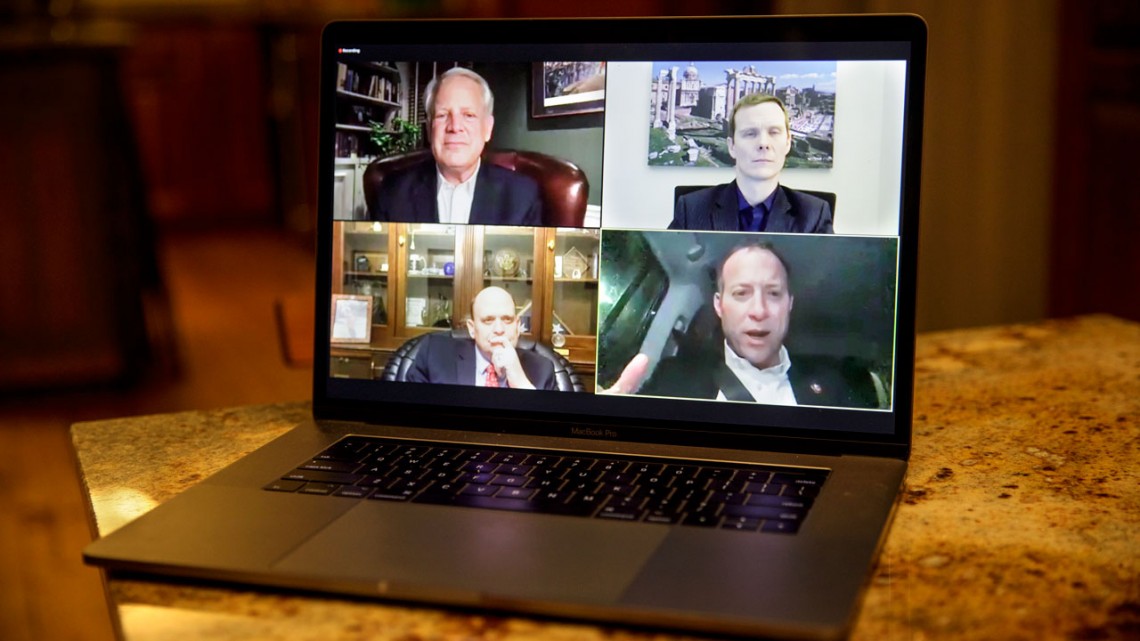
The Institute of Politics and Global Affairs (IOPGA) on Jan. 13 hosted “Bipartisanship in a Time of Crisis? How Members of Congress Can Heal the Wounds and Find Common Ground in a Biden Presidency,” featuring (clockwise from top-left) Steve Israel, IOPGA director; Douglas Kriner, IOPGA faculty director; U.S. Rep. Josh Gottheimer (D-New Jersey); and U.S. Rep. Tom Reed (R-New York).
Lawmakers: Find common ground to help heal democracy
By James Dean
After police hustled him from the House of Representatives gallery to a secure location while a mob breached the U.S. Capitol on Jan. 6, Rep. Josh Gottheimer (D-New Jersey) called one of his closest friends in Congress.
“You OK?” Gottheimer asked Rep. Tom Reed (R-New York), whose district includes Cornell’s Ithaca campus.
Reed confirmed he was safe. Hours later the congressmen, who co-chair the Problem Solvers Caucus, spoke side-by-side on the House floor – Reed joining Gottheimer on the Democratic side of the aisle – to denounce the mob violence as an assault on democracy, elections and the peaceful transfer of power.
“American democracy is so much stronger than that and needs to be protected and stood up for,” Reed recalled a week later. “We thought it was very important to send that message together.”
Reed and Gottheimer discussed their experiences in the Capitol that day – and how to move forward – in “Bipartisanship in a Time of Crisis? How Members of Congress Can Heal the Wounds and Find Common Ground in a Biden Presidency,” a webinar hosted Jan. 13 by the nonpartisan Institute of Politics and Global Affairs (IOPGA). Watch a replay here.
The conversation helped launch the institute’s Campaign for the Future of Democracy, whose mission is “to educate the public about building resilience to support the norms of democracy, something that Democrats and Republicans can both agree on,” said Steve Israel, IOPGA’s director and professor of practice in the Department of Government, in the College of Arts and Sciences (A&S).
Douglas Kriner, the Clinton Rossiter Professor in American Institutions in the Department of Government (A&S) and IOPGA faculty director, introduced the program, which was held just hours after the House impeached President Donald Trump for a second time.
Israel, a former Democratic congressman from New York, called Reed and Gottheimer pioneers in finding common ground and promoting civil dialogue in today’s hyperpartisan environment. How, he asked, can members of Congress repair trust, develop partnerships and bridge the partisan divide?
The two lawmakers cited strategies practiced within the Problem Solvers Caucus, whose 50 members are split evenly among Democrats and Republicans, and which endorses policy or legislation only if supported by at least 75% of the caucus.
Among their strategies:
- Talk often to develop relationships, not just at the last minute.
- Listen actively to the other side.
- Advocate for ideas, but respect those who disagree.
- Stay in the room even when passions run high.
- Avoid misunderstandings over language each side might interpret differently.
- Focus on areas where agreement is possible.
- Put in the work, and don’t give up.
“It takes a lot of time and energy to sit down and have those conversations and work together,” Gottheimer said. “It’s easier just to be partisan.”
The alternative, the congressmen said, is to settle for bills unlikely to get through the Senate or to the president’s desk to be signed into law – “a different caliber of legislation,” Reed said.
Israel pointed to the $900 billion coronavirus relief package passed last month as a case study. Spearheaded by the Problem Solvers Caucus, many had considered such a compromise package unachievable, Israel said, after months of impasse between leaders in Congress and the White House.
Through constant negotiation and concentration on areas where agreement could be found, all the way to printing draft legislative text that addressed minute details, Reed said, the proposal became too strong to ignore.
“We did all that initial work, which was a lot of hard work, to kind of break the clutter (and) get these guys focused,” he said.
“It wasn’t pretty, but it’s the model for how we’re going to govern, I believe, in this (next) Congress,” Gottheimer added. “It’s the way we’re going to be able to get things done, is by us all working together and trying to find that common ground.”
After President-elect Joe Biden’s inauguration, Reed and Gottheimer said, they anticipate opportunities to collaborate on additional COVID-19 relief and an infrastructure bill, then potentially on immigration, health care, the environment and police reform. Reed suggested a “mini-package” on each item could win bipartisan support if the president was willing to accept something less than total victory.
And importantly, Gottheimer said, “we’re going to have to also figure out a way to heal.”
Israel noted that some of the comments submitted by the webinar’s audience of more than 700 understandably reflected raw emotions inflamed by recent events. But he shared one, from a high school student, that thanked the panelists for providing inspiration to continue fighting for democracy.
That’s the spirit driving the Campaign for the Future of Democracy, “a nonpartisan platform to have conversations like this to once again engage in civil dialogue and bipartisan engagement,” Israel said, “and build the resilience against those who try and subvert and weaken democracy, foreign or domestic.”
Media Contact
Get Cornell news delivered right to your inbox.
Subscribe
